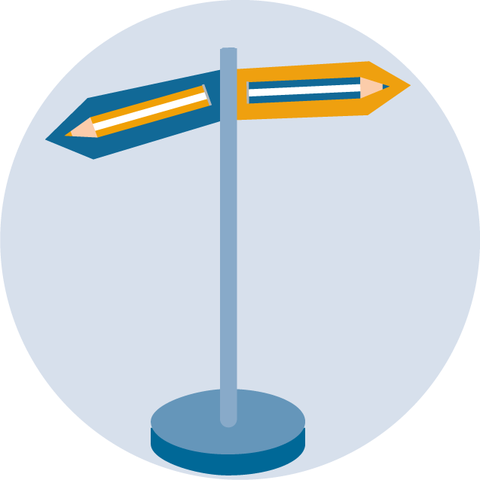Feb 24, 2022
Steep thesis: Expectations in the examination phase are often unrealistic
The ideal me during exam time: Hermione Granger - inquisitive, structured, slightly snooty due to her blatant knowledge advantage, and equipped with summaries that my fellow students are dying to get their hands on.
My typical self during exam time: Ronald Weasley - chronically bad-tempered, always looking for his own motivation, slightly panic-stricken due to the time running out and the approaching deadline, and often to be found sleeping in the library.
In fact, one can say: students sometimes have unrealistic self-efficacy expectations of themselves during the exam period (Pütz 2021, p. 114). After all, even Hermione could only manage this time with the help of a magic time-travel clock.
Of course, this should not discourage anyone, nor should it invite them to stop making an effort - a course of study should and must also challenge you, otherwise we would not need to study. Nevertheless, we should all try to avoid negative stress during our studies, for example by planning our time realistically. (Robert explains how you can set up a halfway realistic time and writing plan in the Good Question post). However, if stress catches up with you during the exam period despite all your efforts, this is by no means a sign of personal failure. On the contrary: according to the 2017 Health of Students in Germany study (Grützmacher et al. 2018), around a quarter of all students suffer from stress. A study published by the AOK Bundesverband in 2016 also equally suggests that exam time is the biggest stress trigger - even ahead of final papers - and that stress is associated with pressure to perform and expectations. So no student is alone with this problem.

Excerpt of the figure "Associations with 'stress in studies'," AOK Bundesverband 2016, p. 21.
But let's put our money where our mouth is: Where do the expectations that lead to stress come from? From our self-esteem - or the fear that we are not worthy and not capable ( Metzig & Schuster 2018, pp. 3-5). It sounds logical: If you are relaxed and get through the exams with good results, you are successful in your studies - and successful in life. You see yourself highly motivated in your mind's eye learning, cramming, taking exams. But then comes the comparison with reality and you realize: "It's not working for me!"
But it's okay if things don't go well, and we all know that. Too much pressure to perform can become a real burden. This is especially difficult in phases when we should be maximally productive and often ends in new self-reproaches and frustration.
That's why we should critically question our performance expectations. Poor performance does not have to be a sign of weakness. After all, it is also often dependent on one's own form on the day and other external factors.
So how do you escape this dilemma? Sometimes it helps to look to the future by asking yourself, "Will this still matter in 10 years?" In very concrete terms, this means asking yourself during the stressful phase: for example, is it relevant for me to piccobello color my summary now? Does it really have to be 5 hours in the Bib, or will 2 hours perhaps do?
Because in 10 years we will surely not remember every crisis moment, but only the final result: our degree!
Now this was not the instruction to turn into a Hermione Granger. Quite the opposite: this was the plea to not even want to strive for that! Because let's face it: NOBODY is like Hermione Granger - not even Emma Watson!
Looking for support to manage stress during intense writing or exam periods, or to deal with your stressors during a quieter period? Then our self-study course "Stressful" on OPAL (in German) can help you. In addition, you can always book a writing consultation (free of charge for students) to support you with stressful writing tasks; you can find more information about this on our website on writing consultation. And if you notice that everything is actually too much for you or you are looking for a specific conversation about stress, then contact the Zentrale Studienberatung der TU Dresden or the Psychosoziale Beratungsstelle im Studentenwerk Dresden.
about the author: Christina has been working for the Writing Center since the beginning of 2020. There she supports public relations, especially on social media. She also organizes events, such as the writing marathon. In March, Christina will complete her bachelor's degree in political science at the TU Dresden.
Collaboration and editing: Annica Kramer
Undergraduate Assistant
NameChristina Ullrich
Unterstützung e-Learning & Social Media
Send encrypted email via the SecureMail portal (for TUD external users only).
Student Assistant
NameAnnica Kramer
accessibility
Send encrypted email via the SecureMail portal (for TUD external users only).
Literatur:
- AOK Bundesverband (Hrsg.). (2016). Studierendenstress in Deutschland – eine empirische Untersuchung. Studie online auf der Webseite der Universität Heidelberg (22.02.2022).
- Femers-Koch, S. (2021). Biografisches und Kreatives Schreiben gegen Prüfungsangst: Ein theoretisches und methodisches Rahmenkonzept. Wiesbaden: Springer Fachmedien Wiesbaden. Online-Ausgabe über die SLUB.
- Fricke, M. (2017). Wenn Perfektionismus zur Last wird. In: SPIEGEL Online. Online auf https://www.spiegel.de/gesundheit/psychologie/perfektionismus-wenn-der-hohe-selbstanspruch-zur-last-wird-a-1161036.html. (22.02.2022).
- Grützmacher, J, Gusy, B, Lesener, T.,Sudheimer, S., Willige, J. (2018). Gesundheit Studierender in Deutschland 2017. Ein Kooperationsprojekt zwischen dem Deutschen Zentrum für Hochschul- und Wissenschaftsforschung, der Freien Universität Berlin und der Techniker Krankenkasse. Studie online im Webbereich der TK verfügbar (22.02.2022).
- Metzig, W. & Schuster, M. (2018). Prüfungsangst und Lampenfieber: Bewertungssituationen vorbereiten und meistern. (5., aktualisierte Aufl.). Berlin: Springer. Online-Ausgabe über die SLUB.
- Pütz, A. (2021). Stressbewältigung bei Studierenden in den Anfangssemestern. Evaluation einer psychologischen Intervention. Logos Verlag Berlin.
This post appeared on the occasion of the February 2022 Writing Center Newsletter. This and other newsletter issues are linked in the Writing Center Newsletter Archive.
 © TUD
© TUD
Writing Center of TUD
Send encrypted email via the SecureMail portal (for TUD external users only).
Visiting address:
Fritz-Foerster-Bau, room 571 Mommsenstr. 6
01069 Dresden
Postal address:
TUD Dresden University of Technology
Zentrum für Weiterbildung/Career Service
Schreibzentrum
01062 Dresden
The Writing Center of the TU Dresden (SZD) supports students and lecturers with offers for planning and writing various texts in studies such as vouchers, protocols, seminar papers and theses and for teaching academic writing in teaching and supervision. All information about offers and possibilities of support can be found in the areas for students and lecturers.
Translated with www.DeepL.com/Translator (free version)

